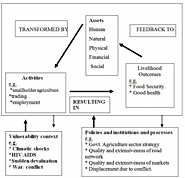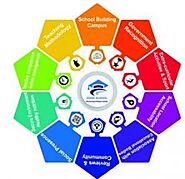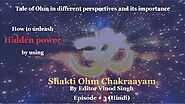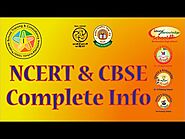-
About
- About Listly
- Community & Support
- Howto
- Chrome Extension
- Bookmarklet
- WordPress Plugin
- Listly Premium
- Privacy
- Terms
- DMCA Copyright
- © 2010-2025 Boomy Labs


 vinod singh
vinod singh
Listly by vinod singh
It is a wiki for disseminating free knowledge in the area of basic education, higher education and education policy for sustainable development where authors are invited to volunteer this project.

A culture of peace has been a dream and hope for human beings for thousands of years, even though different words may have been used. In the last half of the 20th Century, a more precise focus and language have emerged which serves as a guideline for those seeking and leading in this quest.
A culture of peace differentiated in various terms throughout decades has been a dream and hope for human beings. In the last half of the 20th Century, a more precise focus on language emerged, serving as a guideline for those seeking and leading in this quest.

Science Education is the teaching of science to improve one's understanding of the natural world and enhance one's ability to make use of their scientific knowledge to make informed decisions. Science education is important in building sustainable development and livelihood.

COVID-19 has radically changed the way education is delivered and it has had a significant impact on learners' education. All educational systems around the world have had to move their lessons into an online platform in record time, which unfortunately did not allow many schools and teachers to prepare appropriately for this situation leading to a negative impact on students' learning. According to World Bank Education, based on information gathered on others from other outbreaks such as Ebola, this impact is highly damaging in developing countries, which already present disadvantages to access education [1]. Therefore, World Bank Education has developed a range of EdTech knowledge packs or guides to serve the Ministry of Education by also providing off-line solutions such as using radio or television to teach, which have already been implemented successfully in many countries such as Kenya and Morocco [2].

There are several lines of thought about what makes a good school. The key aspects of a good school have been enumerated by UNESCO body UNESCO NEQMAP under its Happy School framework. The framework takes into account a set of qualitative variables that can be measured under three board categories — People, Process and Place. Based on this framework, CCLP Worldwide has come up with standards/criteria to label schools under the Good School category.

A NEST methodology-based exploration of French students’ perceptions of foreign cultures during their overseas internships.

Blended learning is an approach to learning that combines face-to-face and online learning experiences. Ideally, each (both online and off) will complement the other by using its particular strength.[1]

It is generally considered that one of the best routes out of poverty is a “good” Basic Education and Higher Education. However, for poor children in developing countries, education is neither good nor generally available. Often, there are not enough Good Schools for all the children in the area, and many children are not allowed to go to school because their parents believe that they bring more money in when they are working in the fields. Existing schools tend to be under-funded, resulting in poorly trained teachers and no, or insufficient equipment. Many NGOs and charities around the world try to find a solution to this problem, using various strategies.

Academic tenure is defined by De George [1] as " a prize that a faculty member gets after six years of probation and that one then has for the rest of one's career" (ix). The idea behind tenure is that it gives faculty members the intellectual freedom to devote attention to controversial issues without having to worry about repercussions such as getting fired; tenure also protects the faculty member from social sanctions, such as criticism by political or religious powers outside the campus that may disagree with the professor’s research findings and thus pressure the institution to fire him or her. With tenure, faculty can report the results of their research or explorations without fear of censure. Additionally, tenure is a privileged position which liberates a professor from the undue influence or constraints of his or her advisor, under whose supervision junior faculty members remain.

Bhagavadgita also spelled as Bhagavad-Gita and Bhagavad Gita or simply Gita is one of the most sacred and popular religious scriptures of the Indian religion and dharma Hinduism. Hindus, which are those who regard themselves as culturally, ethnically, or religiously adhering to aspects of Hinduism, consider the Bhagavad-Gita as a direct message of Vishnu in the avatar of Krishna, revealed to the people in the form of a long dialogue between Him and Arjuna in the middle of the battlefield of Kurukshetra, where the epic battle of Mahabharata was fought. The Bhagavad-Gita indicates to Hindus how to act in the daily life, with a particular focus on the following aspects: positioning God at the centre of reflection time and other daily activities; fulfilling duties with a sense of detachment and as a way of a personal sacrificial offering; accepting God as the doer and facilitator, in contrast to the Hindus which are mere instruments engaged in the act of liberation and self-realization. According to the religion, those who read the Bhagavad-Gita regularly and with sincerity will receive physical, material, mental, and spiritual benefits. The importance of the Bhagavad-Gita for Hindu people is due to a centuries-long tradition, which continues to be respected by believers till today. For some people, it might be considered more relevant today than it was in the past, as our lives have become more complex and challenging due to the pressure of modern lifestyle. [1]

Lack of environmental awareness and concern in the society is responsible for the degradation of the environment. Rapid loss of environmental quality today is perhaps the most serious threat humanity has ever faced in the history of mankind. Environmental degradation is a global problem and is directly related to natural resource depletion in quality and quantity. This is as a result of population explosion and industrialization related unsustainable and changing lifestyles of modern society. The situation is causing overuse, depletion, and degradation of the finite vital resources. We must understand that environmental degradation is a complex and long term process with no easy or immediate solutions. Despite the technological advancement and material development, modern societies are facing serious environmental problems due to the negative impacts of human activities. It is therefore very much necessary to approach the issues arising out of the situation with proactive rather than reactive attitudes. Citation Needed

Saraswati World School is an International School in technical and academic co-operation with Milleniumi I Trete School Europe. It is established as K +12 CB...

#ohm #aum #ॐ #om #ommeditation #omchanting # ohmchanting #aumchantingohm ॐ Aum (Ohm) Meditation for complete rejuvenation of Physical, subtle, and causal bo...

#cbse #ncert #ideatecbseschoolThis episode of Ideate CBSE School covers the difference between NCERT and CBSE and how they are different and how they work to...

Author | Editor | Edupreneur
Writing blogs for CCLP Worldwide
Writing blogs for Saraswati World School